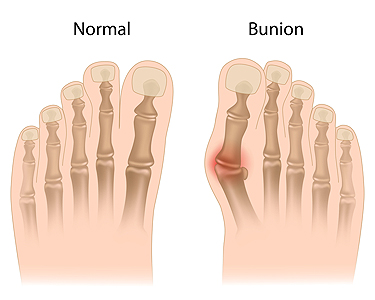
A bunion is a deformity of the joint at the base of the big toe, where the bones gradually shift out of alignment. This happens when the tip of the big toe leans toward the smaller toes, forcing the metatarsal bone inward and forming a bony lump at the joint. Bunions may develop slowly over years, or appear more rapidly in adolescents. Risk factors include family history, wearing shoes that squeeze the toes, inflammatory joint diseases like rheumatoid arthritis, and structural foot problems, such as over-pronation. Bunions often cause pain, redness, swelling, and thickened skin over the joint. A podiatrist can help by providing supportive devices to ease pressure and correcting foot mechanics. In severe cases, surgery may be required to realign the bones and relieve pain. If you have a bunion that is interfering with your daily activities, it is suggested that you schedule an appointment with a podiatrist for an exam and appropriate treatment options.
If you are suffering from bunion pain, contact Mohammad R. Parsa, DPM of Madison Foot Clinic. our doctor can provide the care you need to keep you pain-free and on your feet.
What Is a Bunion?
Bunions are painful bony bumps that usually develop on the inside of the foot at the joint of the big toe. As the deformity increases over time, it may become painful to walk and wear shoes. Women are more likely to exacerbate existing bunions since they often wear tight, narrow shoes that shift their toes together. Bunion pain can be relieved by wearing wider shoes with enough room for the toes.
Causes
- Genetics – some people inherit feet that are more prone to bunion development
- Inflammatory Conditions - rheumatoid arthritis and polio may cause bunion development
Symptoms
- Redness and inflammation
- Pain and tenderness
- Callus or corns on the bump
- Restricted motion in the big toe
In order to diagnose your bunion, your podiatrist may ask about your medical history, symptoms, and general health. Your doctor might also order an x-ray to take a closer look at your feet. Nonsurgical treatment options include orthotics, padding, icing, changes in footwear, and medication. If nonsurgical treatments don’t alleviate your bunion pain, surgery may be necessary.
If you have any questions, please feel free to contact our office located in Madison, MS . We offer the newest diagnostic and treatment technologies for all your foot care needs.
